Pest Control in Parker, Colorado, and Surrounding Areas
Call Today 720-597-8857
Call Today 720-597-8857
Rodent ControlParker Pest Control ServicesCall Us Now 720-597-8857 (Click to call)
Rodents such as rats, mice, voles, and gophers can be a nuisance, present serious health risks, and cause damage to your home, yard, or business property. Moles, though not rodents, are similar to voles and gophers as pests so will be discussed on this page. Parker Pest Control Services is here to help with your rodent control needs.
Or visit pages on these pests: Wildlife Insects Spiders Birds 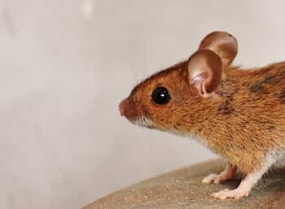 House Mouse House Mouse
Rat Control and Mice Control:
There are a number of rodents that may find a way to take up residence in your home or business. The most common mice and rats in Colorado include the house mouse, the roof rat (black rat), or the sewer rat (brown rat). Deer mice can also sometimes find their way into homes though they prefer woodlands to urban areas. Deer mice are the species of mice that carry hantavirus, which humans can contract and which can be fatal. Hantavirus leads to fever, body aches, chills, difficulty breathing, and kidney failure. Deer mice are slightly larger than house mice and have large eyes and ears with white fur on their tail on the bottom and sides. All these rodents have the ability to squeeze through the smallest crack or crevice to enter your abode. Both rats and mice are covered with fur (of varying colors), but rats are bigger than mice. They live and breed in drains, under concrete, in sub-floors, garbage refuse areas, kitchens, roof voids and other areas where a potential food and water source is available. They like to live in the hardest-to-reach places such as in between walls, under porches, and in crawl spaces. They become a serious problem in autumn and cold winter as they seek to find a place a warm refuge as well as accessible food sources. Rats are more of a problem when a building is located near waterways, creeks and canals or other places where water is ample. Sometimes rats and mice may suddenly appear in large numbers when excavation work disturbs their in-ground nesting locations. Signs of mice or rat infestation include gnaw marks, droppings, scratching or running sounds, or pets smelling their scent. These rodents are not always timid. If confronted, they can become aggressive and bite you. Rats are easily alarmed making it almost impossible to catch them with traps. 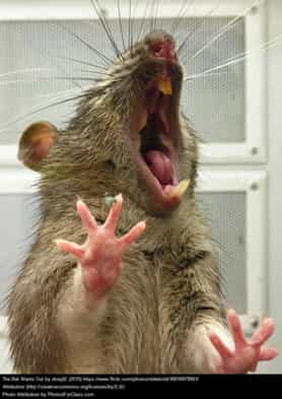 Rat with sharp teeth Rat with sharp teeth
Mice and rats are dangerous for a number of reasons:
Rats can carry Murine Typhus as well as Rat-Bite Fever. Not necessarily contracted through bites, rat-bite fever can cause elevated body temperature, aches, and pains, rash, skin lesions, as well as sore throats and has been linked to increased risk of future health issues, such as meningitis, liver damage, and pneumonia. Common rats in Colorado are the Norway and roof rats. 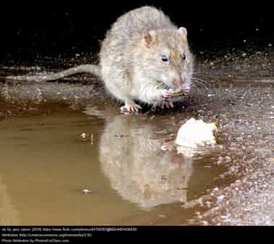 Rat Rat
Rodent populations of mice and rats can grow out of control quickly; within as little as two months, two mice can become two hundred, so addressing rodents in your home or business promptly is advised. Some may try home remedies or products sold at stores, including traps, sticky boards, or other forms of bait, etc. If you try this, be sure that any rodent baiting program you use be in safety dispensers not accessible by children and pets.
The most effective and safe route to exterminate mice and rats is to call on rat or mice exterminators. Professional knowledge of the rodent’s habits is essential to eradicate a problem. For example, rats have an acute sense of smell and will avoid bait touched by human hand. Additionally, rodent control specialists will obtain essential rapid containment using the latest safe technology. Some older style rat baits are ineffective as the rodents have built up immunity over the years to certain baits. Expert mice pest control technicians can also help with preventative measures such as sealing potential rodent entry points into the home or commercial building. Finally, to avoid a rodent onslaught, practice good sanitation and housekeeping. These animals thrive where food and water is readily available. All food stuffs as well as garbage and refuse should be kept in sealed containers. Pet food and water bowls should not be left out at night. Call a professional rat or mouse exterminator today if you need assistance get rid or these rodents. 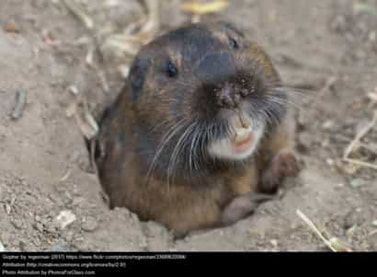 Gopher Gopher
Gopher Control:
Colorado is home to a number of various gopher types: the Botta’s Gopher, Northern Gopher, Plains Gopher and Yellow Faced Gopher. They are often called by their first name: the Pocket Gopher. Gophers and prairie dogs are often confused, yet they are different. Gophers are of the rodent species, while prairie dogs are of the squirrel family. Both burrow in the ground but they differ in other ways. Gophers are much smaller than prairie dogs. They don’t have a distinct neck like prairie dogs, and they have pouches in their cheeks used to store and transport food. A gopher’s tail is hairless while a prairie dog has a bushy one. Gophers eat mostly tubers and the roots of plants and do so from inside their burrows, pulling their food down from below. They will also feed on vegetation above ground near their tunnel, and they particularly like above-ground vegetation when it is green. Shrubs, bushes and trees may also be a yummy treat that they feast on. Gophers are one animal that pest control companies receive the most calls about. South Denver Metro communities all experience trouble from gophers. Gophers can be found living in your lawn or under your patio or porch. They can cause a great deal of damage in your yard and landscaping. They will dig tunnels and leave mounds of dirt and may construct one to three mounds per day or up to 300 mounds per year with most activity occurring in spring and fall. Aside from damaging yards, gophers may gnaw buried cables or PVC sprinkler systems and they soften soil which can be hazardous to livestock. Gopher control and removal should only be handled by specialists who understand the behavior of these animals. Typically, they have to be trapped and relocated, though they can also be treated with rodenticide to control them. It’s best to treat the gopher pest early with follow ups twice a year. If you have a gopher removal need, call Parker Pest Control services at 720-957-8857. 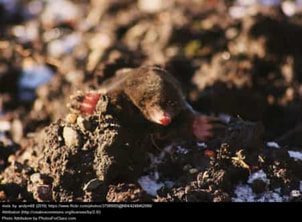 Mole Mole
Vole Control and Mole Control:
Is it a vole or mole? Do you know the difference? Both voles and moles use tunnels and cause damage to lawns, but they differ in many other ways. Moles tunnel underground, lifting the soil upwards making the lawn squishy and soft feeling when you walk on it. They can also create mounds, like gophers. Voles differ in that they tunnel under the snow pack in winter. They remain above ground, creating highways in the grass. They also consume the grass and use it to build nests. Voles look similar to mice and are often called field mice, while a mole’s face is just a nose and mouth. You cannot see the ears or eyes as they are buried beneath the fur so that dirt does not get into them. Moles also have large forefeet used for digging. Moles are preferably carnivorous and like to consume worms, ants, grubs, and other arthropods living in the ground. A small portion of their diet does include various seed and vegetable matter, but they are not technically rodents, which prefer a vegetarian diet. So, if a critter is taking bites out of your plants, you can rule out moles. Moles can indirectly contribute to the destruction of plants, however, when other rodents such as voles exploit the tunnels of moles to access the roots of plants. 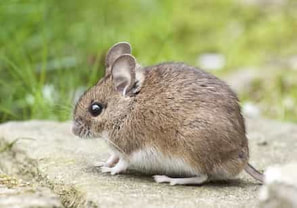 Vole Vole
Voles, in contrast, are rodents and mainly eat the stems and blades of lawn grass (they like root systems). They will gnaw at the bark at the base of a tree or shrub especially in winter. They may also damage flower bulbs and potatoes in a garden. Sometimes they can cause young trees to experience die-back or begin to lean as they damage trees and shrubs by burrowing into their root system. Voles do not leave behind big mounds of dirt, but the runways they leave behind make for an unsightly lawn.
Moles can actually be beneficial in a garden when they are present in small numbers as they eat grubs that kill grass and young shrubs. They can also help with soil maintenance; their digging aerates the soil and carries humus deeper into the earth. Additionally, moles bring mineral-rich sub soil to the surface to make it more available to plants. And in dry climates, their tunnels capture rainfall, trapping it where it doesn’t easily evaporate. Moles are mostly solitary lawn pests who like their own company. After mating season, they dig tunnel systems on their own. Voles, on the other hand, are social creatures who like group living. In a single tunnel, you may find several adult voles. South Denver Metro communities of all experience mole and vole disturbance challenges. Mole and vole control and removal should only be handled by specialists who understand the behavior of these animals. It’s important to know the difference between a mole and a vole because the bait used will be different as one is a vegetarian and the other mainly a carnivore. The best way to remove moles is to trap them. Rodenticides do not work to control moles. And voles can populate quickly so you want to act promptly to remove them. If you have a mole or vole removal need, call Parker Pest Control services at 720-597-8857. Protect what matters most to you
|
When do I need the help of an expert rodent exterminator?There may be many reasons to enlist the help of mice or rat exterminator when dealing with rodent infestations. Licensed technicians are trained to identify the type of species you’ve encountered and can recommend the best form of regulation as well as perform repairs or alterations on your home or business to ensure that the invading rodents will not return. We utilize a number of methods, products, and solutions for eliminating rodent infiltrations. Depending on the found problem, we may use:
Our team at Parker Pest Control Services cares for the safety of humans, pets, and for the environment so we make it our goal to use natural pest control methods whenever possible. For rodent trouble of smaller proportions, there are extermination methods available in common home improvement stores, but there are scenarios where these products will be ineffective. You should give us a call if there are multiple species you are dealing with, if the problem persists after trying home remedies, or if you have a recurring infestation situation that could use the help of trained experts who can assist in locating and removing the source of infestation and preventing future rodent invasions. |


